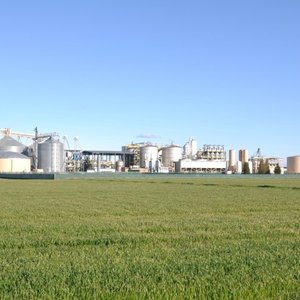Aemetis to add Zebrex membrane technology at Keyes plant

Aemetis Inc.
September 6, 2018
BY Erin Krueger
Aemetis Inc. has announced plans to implement the Mitsubishi Chemical Corp. Zebrex membrane dehydration system at its 60 MMgy ethanol plant in Keyes, California. As MCC’s marketing, engineering, procurement and construction (EPC) partner in the U.S., IMC Inc. will design and fabricate the unit for Aemetis.
According to Aemetis, the project marks the first Zebrex system installation in North America and is the largest implementation of the Zebrex system worldwide. To date, the system has been installed at approximately 70 alcohol production plants worldwide. According to ICM, the installation capacity will be 200,000 gallons per day, or 70 million gallons per year, of dehydration production.
Advertisement
Advertisement
ICM explains that Zebrex technology improves production capacity and reduces energy costs through the use of state-of-the-art zeolite membrane dehydration technology. Ethanol and water are separated by the precise selectivity of the zeolite to produce 99.8 percent purity ethanol and recycle water in a single pass.
When compared to the traditional pressure swing adsorption (PSA) dehydration process, the Zebrex system can reduce energy consumption in the production of biofuels by 25 percent. As a result, production capacity is increased while the use of fossil fuel-based energy is reduced, lowering the carbon intensity (CI) of fuel produced at the plant.
“The implementation of the Mitsubishi Zebrex technology at the Aemetis Keyes plant is an excellent example of how the biofuels industry is utilizing advanced technology to reduce production costs and lower carbon emissions while increasing revenue per gallon and expanding capacity at both traditional and advanced ethanol production plants,” said Eric McAfee, Chairman and CEO of Aemetis.
Advertisement
Advertisement
“We are excited to be working with both MCC and Aemetis on this first installation in the U.S.,” said Steve Hartig, vice president of technology at ICM. “MCC’s knowledge of membrane technology, along with their large-scale production of the membrane units, fits perfectly with ICM’s knowledge of the ethanol industry, ability to seamlessly integrate this technology into existing plants, local fabrication of the modules in our Kansas manufacturing shop and then ultimately performing the EPC and supporting start up at the plants.
“This system provides ethanol plants with a more efficient method for separating water from ethanol,” Hartig continued. “The plants that have implemented the Zebrex technology have reported reduced energy costs and increased production capacity of 15-25 percent compared with traditional methods.”
Related Stories
The U.S. Energy Information Administration maintained its forecast for 2025 and 2026 biodiesel, renewable diesel and sustainable aviation fuel (SAF) production in its latest Short-Term Energy Outlook, released July 8.
XCF Global Inc. on July 10 shared its strategic plan to invest close to $1 billion in developing a network of SAF production facilities, expanding its U.S. footprint, and advancing its international growth strategy.
U.S. fuel ethanol capacity fell slightly in April, while biodiesel and renewable diesel capacity held steady, according to data released by the U.S. EIA on June 30. Feedstock consumption was down when compared to the previous month.
XCF Global Inc. on July 8 provided a production update on its flagship New Rise Reno facility, underscoring that the plant has successfully produced SAF, renewable diesel, and renewable naphtha during its initial ramp-up.
The USDA’s Risk Management Agency is implementing multiple changes to the Camelina pilot insurance program for the 2026 and succeeding crop years. The changes will expand coverage options and provide greater flexibility for producers.
Upcoming Events










